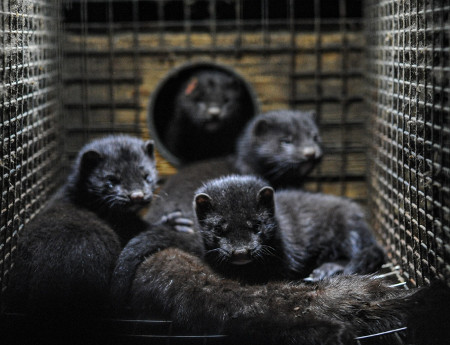
Latest research performed with the participation of JU scientists from the Małopolska Centre of Biotechnology, Prof. Krzysztof Pyrć and Dr Natalia Mazur-Panasiuk, suggests that COVID-19 might be transmissible from animals to humans. Analyses based on the case of a Polish mink farm employee were published in Clinical Microbiology and Infection.
The paper published in Clinical Microbiology and Infection was written jointly by researchers from the Jagiellonian University, Medical University of Gdańsk, University of Gdańsk and University of Helsinki. They state that the first reports of possible transmission of the virus from animals to people date back to November 2020. Although such cases seemed to be rare, the researchers wanted to conclusively prove whether or not the virus can jump from animals to people.
They analysed the case of a mink farm employee in northern Poland: he didn’t display any symptoms, but tested positive for SARS-CoV-2. According to the researchers, the test’s positive outcome was not a result of sample contamination. Genetic analysis has shown that the virus exhibited the same mutations that were found in the one infecting minks. Most probably the variant was already present in the species in November 2020.
Mutations allow viruses to adapt to different living organisms, but their role is still not fully known. We are not fully aware of how mutations impact infectivity, course of illness and immune response. It is therefore advisable to monitor cases of this variant in humans.
The researchers point out that their study was very narrow in scope, as they only tested people living close to the farm. They recommend further investigation of the neighbouring population.
SARS-CoV-2 is the third coronavirus with animal origins that infects humans after SARS and MERS. Scientists say that in spite of mass vaccinations, it is difficult to predict how the virus will change, and its ubiquity, genetic diversity and access to animal reservoirs make the prospect of acquiring herd immunity and completely eliminating the virus rather unlikely. They also point to the fact that SARS-CoV-2 was detected in mammals all around the world: cats, dogs, tigers, lions, deer, ferrets and minks. Transmission of the virus between animals and humans was previously observed in Denmark and the Netherlands.
Researchers call for nationwide monitoring of zoonotic infections and genetic analysis of virus variants in humans.
Source: www.naukawpolsce.pap.pl





